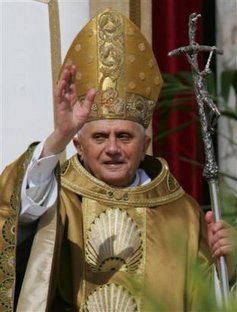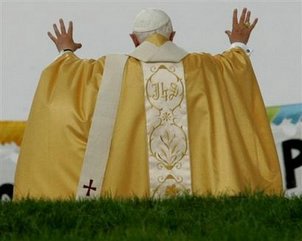God's Priests Must Be Healthy
I am interested only in the defense of truth and Father Joseph Fessio of Ave Maria University does this with fortitude in his television interview.
Watch it here or read the transcript here.

"AND I SAY ALSO UNTO THEE THAT THOU ART PETER, AND UPON THIS ROCK I WILL BUILD MY CHURCH; AND THE GATES OF HELL SHALL NOT PREVAIL AGAINST IT. AND I WILL GIVE UNTO THEE THE KEYS OF THE KINGDOM OF HEAVEN" -MATTHEW 16: 18-19 +++ PRAYING FOR THE POPE IN THE PETRINE MINISTRY +++ LOYAL TO THE MAGISTERIUM +++POWERHOUSE OF THE LAITY
 The Holy Father celebrating First Vespers of the First Sunday of Advent on November 26, 2005, for the new Liturgical Year. (Image from Associated Press)
The Holy Father celebrating First Vespers of the First Sunday of Advent on November 26, 2005, for the new Liturgical Year. (Image from Associated Press) St. Cecilia, virgin and martyr by Cosimo Musio
St. Cecilia, virgin and martyr by Cosimo Musio  The popular patron saint of musicians is one of the best loved and venerated martyrs of Rome, because of her own free will she gave up her life to defend the Christian faith.
The popular patron saint of musicians is one of the best loved and venerated martyrs of Rome, because of her own free will she gave up her life to defend the Christian faith. "Sacred Scripture contains no text concerning the event commemorated in today's liturgy. For something of a historical background one may consult the apocryphal works, particularly the Protoevangel of St. James (ch. 4:1ff). After an angel had revealed her pregnancy, Anna is said to have vowed her future child Mary to the Lord. Soon after birth the infant was brought to the sacred precincts at which only the best of Israel's daughters were admitted. At the age of three she was transferred to the temple proper (7:2). According to legend, here she was reared like a dove and received her nourishment from the hand of an angel (8:1).
"Sacred Scripture contains no text concerning the event commemorated in today's liturgy. For something of a historical background one may consult the apocryphal works, particularly the Protoevangel of St. James (ch. 4:1ff). After an angel had revealed her pregnancy, Anna is said to have vowed her future child Mary to the Lord. Soon after birth the infant was brought to the sacred precincts at which only the best of Israel's daughters were admitted. At the age of three she was transferred to the temple proper (7:2). According to legend, here she was reared like a dove and received her nourishment from the hand of an angel (8:1).CBS will air a four-hour mini-series of the life of Pope John Paul II on December 4 and 7. Yesterday at the Vatican, Pope Benedict XVI watched a special screening with Italian subtitles, with about 6,000 people in attendance. At one point, the audience applauded when an actor who played Cardinal Ratzinger appeared on the screen. English actor Cary Elwes plays the young Karol Wojtyla and American actor Jon Voight plays the older Pope John Paul II. Voight, who was raised Catholic, was greeted personally by the Holy Father.
Here is the official report from the Vatican.
VATICAN CITY, NOV 18, 2005 (VIS) - Yesterday evening in the Vatican's Paul VI Hall, in the presence of the Holy Father, a screening was held of the film "Pope John Paul II." The film was produced by the Lux Vide company, and by RAI (Italian State Television) in collaboration with other European television networks and the American broadcaster, CBS.
After the screening, Benedict XVI expressed his thanks to Ettore Bernabei, president of Lux Vide, and to others who collaborated in making the film, which opens with the attempt on John Paul II's life in St. Peter's Square on May 13, 1981.
"Watching this film," said the Holy Father, "has renewed in me and, I think, in everyone who had the gift of knowing (John Paul II), a sense of profound gratitude to God for having given the Church and the world a Pope of such an exalted human and spiritual stature.
Benedict XVI went on: "Over and above any specific evaluation, I feel the film constitutes further proof ... of the love people hold for Pope John Paul, and of their great desire to remember him, to see him again, to feel him close. And beyond its superficial and emotive aspects, this phenomenon clearly has an intimate spiritual dimension, which we here in the Vatican see every day watching the multitudes of pilgrims who come to pray, or just to pay rapid homage, at his tomb in the Vatican Grottoes.
"That affective and spiritual bond with John Paul II, which became even closer during the period of his final illness and death, was not interrupted. It has never been broken, because it is a bond between souls, between the great soul of the Pope and the souls of innumerable believers; between his fatherly heart and the hearts of countless men and women of good will who recognized in him a friend, and a defender of man, of truth, of justice, of freedom and of peace. All over the world, many people admired in him above all the coherent and generous witness to God."

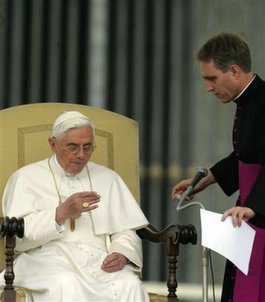
 Saint Gertrude, Virgin, Mystic, and Benedictine Abbess, was called by Our Lord Himself, "My chosen Lily", and the Church has given her the title of "Great" although she is not counted among the Doctors of the Church, at least as of yet. She is the only woman Saint to have been accorded this honor. There are four St. Gertrudes, one of whom was the Abbott of the monastery when Gertrude entered there at five, so it is an added blessing that she is distinguished by the term Great, for our sakes, because there is one less opportunity for confusion. It ought to come as no surprise that she was born in that great age of Saints, the 13th century, among which are numbered St. Thomas Aquinas, St. Elizabeth of Hungary, and in the later years of which, both St. Francis of Assisi and St. Dominic, the latter two being born in the 12th century. Not only was this century the "Century of Saints", but the age of the most wondrous of Saints.
Saint Gertrude, Virgin, Mystic, and Benedictine Abbess, was called by Our Lord Himself, "My chosen Lily", and the Church has given her the title of "Great" although she is not counted among the Doctors of the Church, at least as of yet. She is the only woman Saint to have been accorded this honor. There are four St. Gertrudes, one of whom was the Abbott of the monastery when Gertrude entered there at five, so it is an added blessing that she is distinguished by the term Great, for our sakes, because there is one less opportunity for confusion. It ought to come as no surprise that she was born in that great age of Saints, the 13th century, among which are numbered St. Thomas Aquinas, St. Elizabeth of Hungary, and in the later years of which, both St. Francis of Assisi and St. Dominic, the latter two being born in the 12th century. Not only was this century the "Century of Saints", but the age of the most wondrous of Saints.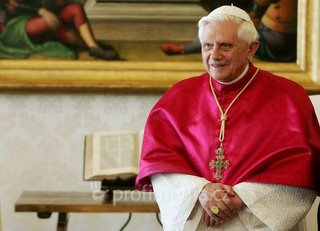
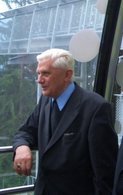
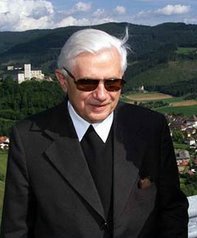 The Holy Father's preference for cardigan over collared dress shirt and dark jacket...
The Holy Father's preference for cardigan over collared dress shirt and dark jacket......and cool shades.
